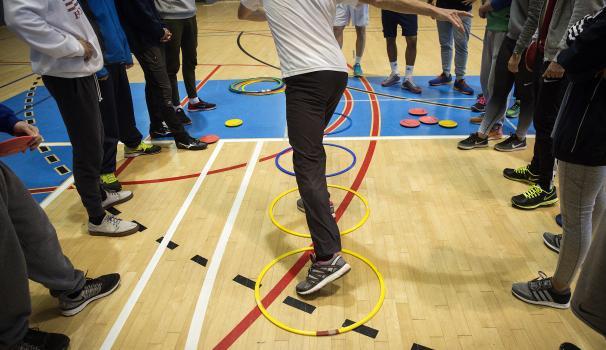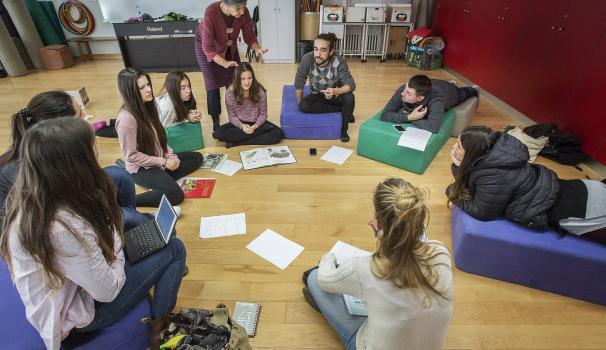Essential intervention in different population groups
From developmental difficulties in infancy, to alterations caused by age or by illnesses and accidents.
Enrolment open

8 a.m. to 2 p.m.
Blanquerna-URL - Carrer del Císter, 34. 08022 Barcelona
School of Psychology, Education and Sport Science
Aimed at future students who wish to acquire knowledge and professional skills in both degrees. A unique track, acquiring the necessary skills to be an excellent professional with this double profile.
The double degree in Psychology and Speech Therapy of Blanquerna-URL offers students the tools to intervene successfully in the professional world, from a care and speech therapy perspective.
From developmental difficulties in infancy, to alterations caused by age or by illnesses and accidents.
Specialized in improving the skills of those who, without suffering any disorder, want to be more efficient when communicating.
Ability to develop innovative ways of acting in each of the disciplines.
A graduate in Psychology and Speech and Language Therapy has unique career opportunities
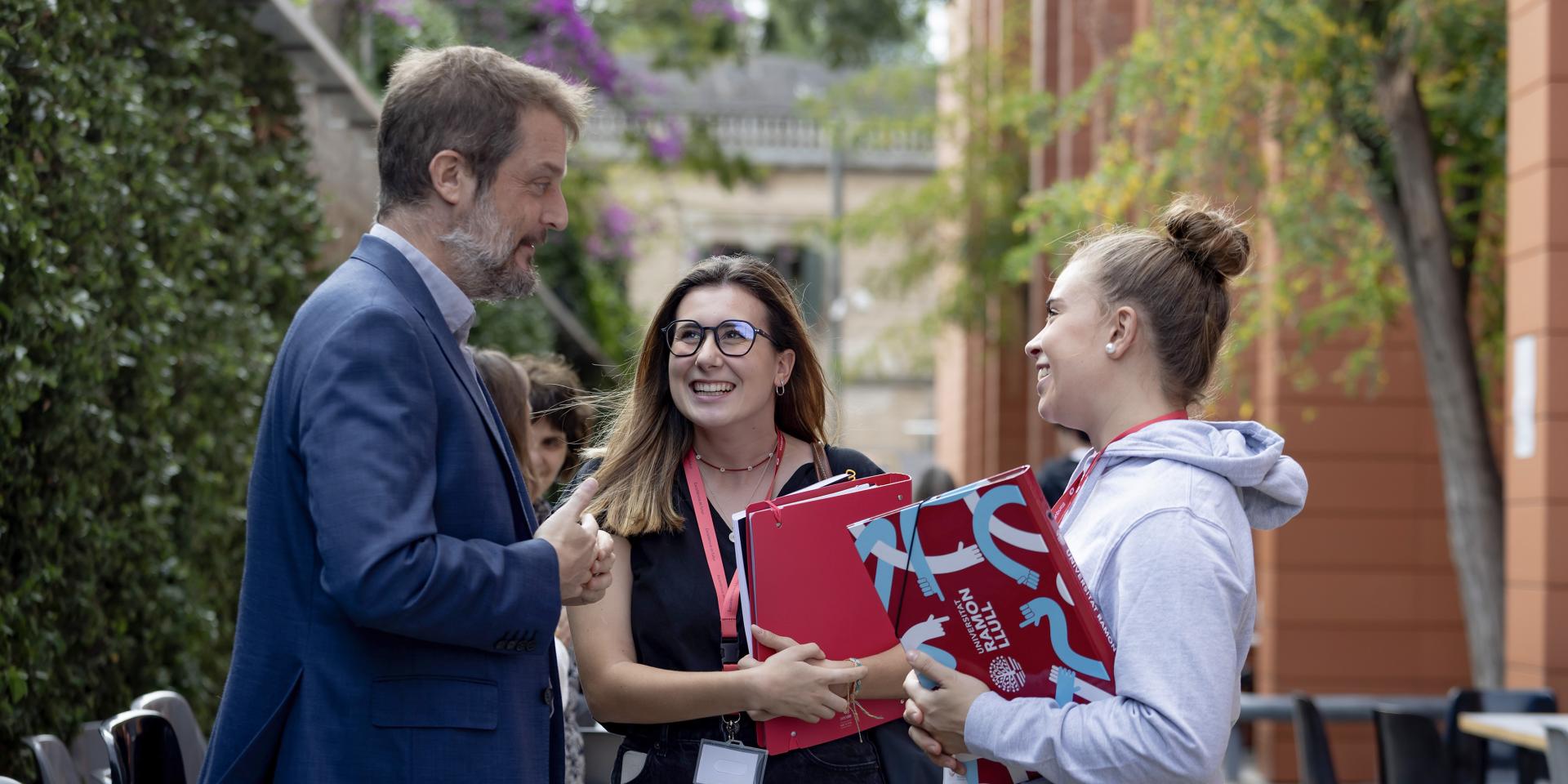
During the double degree, the student has the possibility to specialize in the following:
Students of the double degree in Psychology and Speech and Language Therapy of the FPCEE Blanquerna-URL will get a major in Health Psychology.
The double degree offers the possibility to major in Clinical Intervention or Educational Psychology.
occupational integration in Speech and Language Therapy
occupational integration in Psychology
internship centers with agreements
Occupational Quality of the degree in Speech and Language Therapy, the best percentage of all bachelor's degrees (average of 58.5%)
The Blanquerna methodology is based on seminars, a core element in achieving personalized and qualitative learning and holistic training that includes not only academic and professional competencies but also personal and human skills.
Seminars with small groups of 10-12 students facilitate interdisciplinary learning, intellectual and professional reflection, and customized learning. The faculty advisor collaborates in students' academic, personal and vocational orientation.
We have agreements with more than one thousand internship centers and a 95% job placement. Internships are carried out in pioneering and innovative organizations, institutions and schools that allow you to vindicate everything you have learned during the degree.
Studying abroad is a life-changing experience. We offer you the opportunity to take part in various exchange programs and international cooperation programs and to do internships abroad. Furthermore, the curriculum includes training to obtain B2 level English certification.
ApS (Learning and Service) is a complex activity that integrates service to the community with learning: one of the main ideas is that our students can learn by accompanying other social institutions and continue to grow in the acquisition of values and critical thinking. These are activities or projects in which learning is linked to performing a real service.
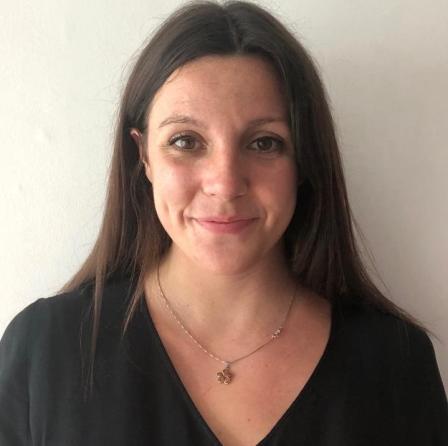

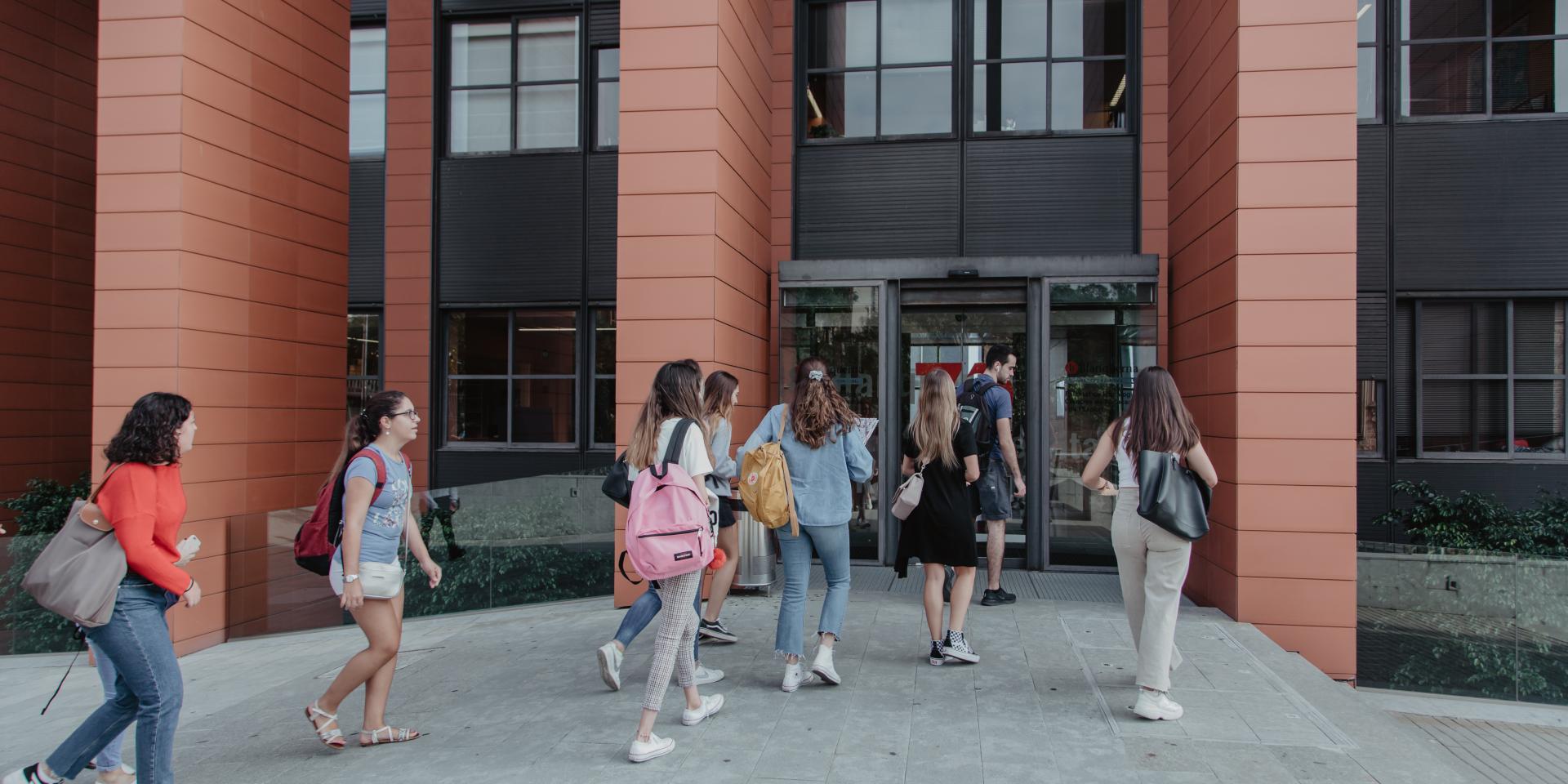
Study for two majors simultaneously, consecutively or following a track tailored to you
News

July 20, 2023

April 24, 2023
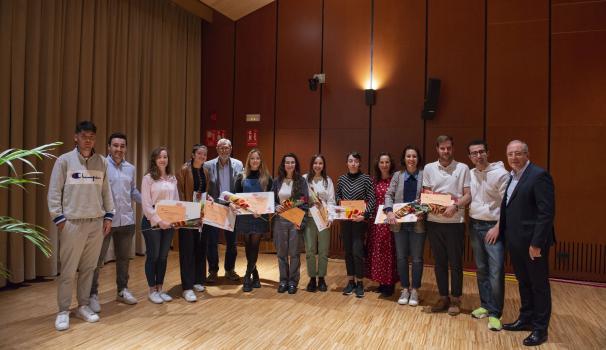
April 21, 2023
The curriculum of the Double Degree in Psychology and Speech and Language Therapy consists of core, compulsory and elective subjects, work placements and a final thesis across the different disciplines of psychology and speech and language therapy, such as; medicine, education and linguistics. It is taught by researchers and active professionals who share the latest advances and their practical application in the educational and clinical fields. Within this plan, you will be able to choose the various electives courses according to the professional profile you want to specialize in. You can see it in detail below:
| First | Second | Third | Fourth | Fifth | Total | ||
| Practicum | 12 | 12 | 12 | 36 | |||
| Final degree project | 18 | 18 | |||||
| Core curriculum | 48 | 12 | 6 | 66 | |||
| Compulsory | 24 | 60 | 54 | 54 | 24 | 216 | |
| Optional | 6 | 6 | 12 | 24 | |||
| Total | 72 | 72 | 72 | 72 | 72 | 360 |
| Subject | |||
| First semester | |||
| Speech Therapy subjects | |||
| Methodology for University Work | 6 | Core curriculum | |
| Basic Psychology | 6 | Core curriculum | |
| Behavioral neuroscience | 6 | Core curriculum | |
| Introduction to the theories and models of speech therapy | 6 | Compulsory | |
| General Linguistics | 6 | Core curriculum | |
| Developmental Psychology | 6 | Core curriculum | |
| Seminar I: Written communication | Compulsory | ||
| Second semester | |||
| Speech Therapy subjects | |||
| Foundations of Human Communication | 6 | Core curriculum | |
| Social Psychology | 6 | Compulsory | |
| Biological bases of communication: Anatomy and Physiology | 6 | Core curriculum | |
| Communication and expression | 6 | Compulsory | |
| Applied Linguistics | 6 | Core curriculum | |
| Speech Therapy subjects | |||
| Psychology of the life cycle: Developmental psychology II: adolescence, youth, adults, seniors | 6 | Compulsory | |
| Seminar II: Perspectives of psychological knowledge | Compulsory |
| Subject | |||
| Third semester | |||
| Speech Therapy subjects | |||
| Foundations of the Scientific Method | 6 | Core curriculum | |
| Brain functions | 6 | Core curriculum | |
| Methodology for the evaluation and exploration of language | 6 | Compulsory | |
| Seminar III: Anatomophysiology and ApS | Compulsory | ||
| Psychology subjects | |||
| Psychological bases of behavior: Basic psychology II: sensation and perception; motivation and emotion | 6 | Compulsory | |
| Personality and context I: Educational psychology | 6 | Compulsory | |
| Personality and context I: Group psychology | 6 | Compulsory | |
| Fourth semester | |||
| Speech Therapy subjects | |||
| Disorders and exploration of voice | 6 | Compulsory | |
| Disorders and exploration of children's oral language | 6 | Compulsory | |
| Disorders and exploration of children's written language | 6 | Compulsory | |
| Evaluation of speech disorders | 6 | Compulsory | |
| Psychology subjects | |||
| Personality and context II: Psychology of the Personality | 6 | Compulsory | |
| Personality and context II: Psychopathology | 6 | Compulsory | |
| Seminar IV: Psychology and mental health | Compulsory |
| Subject | |||
| Fifth semester | |||
| Speech Therapy subjects | |||
| Intervention in voice disorders | 6 | Compulsory | |
| Intervention in speech disorders | 6 | Compulsory | |
| Intervention in children's language development disorders | 6 | Compulsory | |
| Anthropology | 6 | Compulsory | |
| Practical Placement I | 6 | Practicum | |
| Psychology subjects | |||
| Psychological assessment and diagnosis I: Clinical environment assessment | 6 | Compulsory | |
| Psychological assessment and diagnosis I: Assessment in the Educational Field | 6 | Compulsory | |
| Seminar V: Psychological evaluation and research methods | Compulsory | ||
| Sixth semester | |||
| Speech Therapy subjects | |||
| Research methods | 6 | Compulsory | |
| Language Disorders and Examination in Adults | 6 | Compulsory | |
| Hearing disorders, exploration and hearing aids | 6 | Compulsory | |
| Practical placement II | 6 | Practicum | |
| Seminar VI: Multiculturalism and intervention models | Compulsory | ||
| Psychology subject | |||
| Health Psychology and Psychotherapy | 6 | Optional |
| Subject | |||
| Nineth semester | |||
| Speech Therapy subjects | |||
| Ethics and deontology | 6 | Compulsory | |
| Contemporary thinking | 6 | Compulsory | |
| Augmentative communication | 6 | Compulsory | |
| Seminar VII: Psychological intervention I: professional skills | Compulsory | ||
| Tenth semester | |||
| Speech Therapy subjects | |||
| Final degree project | 6 | Compulsory | |
| Seminar VIII: Synthesis of learning | Compulsory | ||
| Speech Therapy subjects | |||
| Historical Development of Psychology: History of Psychology | 6 | Core curriculum | |
| Annual | |||
| Psychology subjects | |||
| Practicum: ethics, Deontology, and Professional Competences | 12 | Compulsory | |
| Choose one of the two Final Degree Projects | |||
| Final degree project (Clinical Intervention mention) | 12 | Final degree project | |
| Final Degree Project (Mention in Educational Psychology) | 12 | Final degree project | |
| Speech Therapy subject | |||
| English B2 | 6 | Compulsory |
| First | Second | Third | Fourth | Fifth | Sixth | Total | |
| Practicum | 12 | 12 | 12 | 36 | |||
| Final degree project | 12 | 12 | 24 | ||||
| Core curriculum | 48 | 6 | 30 | 6 | 6 | 96 | |
| Compulsory | 24 | 66 | 42 | 54 | 24 | 210 | |
| Optional | 30 | 24 | 54 | ||||
| Total | 72 | 72 | 72 | 72 | 78 | 54 | 420 |
| Subject | |||
| First semester | |||
| Seminari: Introduction to Speech and Language Therapy | 6 | Compulsory | |
| Biological Bases I | 6 | Core curriculum | |
| Human Development | 6 | Core curriculum | |
| Linguistic Bases of Communication | 6 | Core curriculum | |
| Learning strategies and skills for university I: Methodology for studying psychology at university | 6 | Core curriculum | |
| Psychological bases of behavior: Basic psychology I: learning and memory | 6 | Compulsory | |
| Seminar I: Introduction to Psychology and university work | 0 | Compulsory | |
| Second semester | |||
| Development of Communication | 6 | Core curriculum | |
| Biological Bases II | 6 | Core curriculum | |
| Neuroanatomy and Physiology | 6 | Core curriculum | |
| Communication and human cognition: Basis of communication and human cognition | 6 | Compulsory | |
| Social bases of behavior: Social psychology | 6 | Core curriculum | |
| Psychology of the life cycle: Developmental psychology II: adolescence, youth, adults, seniors | 6 | Compulsory | |
| Seminar II: Perspectives of psychological knowledge | 0 | Compulsory |
| Subject | |||
| Third semester | |||
| Speech disorders and speech therapy | 6 | Compulsory | |
| Language-Based Learning Disabilities: Examination | 6 | Compulsory | |
| Language Development Disorders and Examination | 6 | Compulsory | |
| Disorders, Examination and Intervention in the Autistic Spectrum | 6 | Compulsory | |
| Psychological bases of behavior: Basic psychology II: sensation and perception; motivation and emotion | 6 | Compulsory | |
| Child and adolescent psychopathology | 6 | Core curriculum | |
| Seminar III: Humanities, person and context | 0 | Compulsory | |
| Fourth semester | |||
| Intervention in Speech Disorders | 6 | Compulsory | |
| Intervention in Language Development Disorders | 6 | Compulsory | |
| Intervention in Language-Based Learning Disabilities | 6 | Compulsory | |
| Body and Voice in Communication | 6 | Compulsory | |
| Personality and context II: Psychology of the Personality | 6 | Compulsory | |
| Personality and context II: Psychopathology | 6 | Compulsory | |
| Seminar IV: Psychology and mental health | 0 | Compulsory |
| Subject | |||
| Fifth semester | |||
| Acquired Language Disorders: Examination | 6 | Compulsory | |
| Disorders, Examination and Intervention in Deglutition | 6 | Compulsory | |
| Humanities: Contemporary thinking | 6 | Compulsory | |
| Logopedia en Entornos Educativos y Comunitarios | 6 | Core curriculum | |
| Humanities: Psychology & sociology of transcendence | 6 | Core curriculum | |
| Personality and context I: Group psychology | 6 | Compulsory | |
| Sixth semester | |||
| Intervention in Acquired Language Disorders | 6 | Compulsory | |
| Hearing Disorders, Examination and Intervention: Audiology | 6 | Compulsory | |
| Speech and Language Therapy in Clinical and Hospital Settings | 6 | Core curriculum | |
| Personality and context I: Educational psychology | 6 | Compulsory | |
| Psychobiological bases of behavior II: Behavioral neuroscience II | 6 | Core curriculum | |
| Psychobiological bases of behavior II: Psychophysiology | 6 | Core curriculum |
| Subject | |||
| Seventh semester | |||
| Practicum I | 6 | Practicum | |
| Voice Disorders and Examination | 6 | Compulsory | |
| Medical Anthropology | 6 | Compulsory | |
| Psychological assessment and diagnosis I: Clinical environment assessment | 6 | Compulsory | |
| Psychological assessment and diagnosis I: Assessment in the Educational Field | 6 | Compulsory | |
| Assessment in organisations: Sectorial organisations | 6 | Compulsory | |
| Seminar V: Psychological evaluation and research methods | 0 | Compulsory | |
| Eighth semester | |||
| Practicum II | 6 | Practicum | |
| Intervention in Voice Disorders | 6 | Compulsory | |
| Disorders, Examination and Intervention in Intellectual Disability | 6 | Compulsory | |
| Fundamentals of the Scientific Method | 6 | Core curriculum | |
| Psychological assessment and diagnosis II: Evaluation of psychopathology in children and infants | 6 | Compulsory | |
| Psychological assessment and diagnosis II: Evaluation of psychopathology in adults | 6 | Compulsory | |
| Seminar VI: Clinical evaluation and psychotherapeutic guidelines | 0 | Compulsory |
| Subject | |||
| Nineth semester | |||
| Practicum III: Ethics and Deontology | 6 | Practicum | |
| Clinical cases | 6 | Compulsory | |
| Option I (must choose 1) | |||
| Speech and Language Therapy in Educational Settings | 3 | Optional | |
| Clinical and Hospital Practice | 3 | Optional | |
| Optionality II (must choose 1) | |||
| Speech and Language Therapy in Healthcare Settings | 3 | Optional | |
| Speech and Language Intervention in Prosthetic Audiology | 3 | Optional | |
| Research Methods | 6 | Compulsory | |
| Research Methods: Observational and case study methodology | 6 | Compulsory | |
| Tenth semester | |||
| Practicum IV | 6 | Practicum | |
| Clinical cases II | 6 | Compulsory | |
| Optionality III (choose 1) | |||
| Neonatal Speech and Language Therapy | 3 | Optional | |
| Speech and Language Therapy in Child Development and Early Intervention | 3 | Optional | |
| Optionality IV (choose 1) | |||
| Speech and Language Therapy in Special Education | 3 | Optional | |
| Speech and Language Therapy in Critically Ill Patients | 3 | Optional | |
| Psychopedagogical Intervention Bases: Psychopedagogical Intervention Bases and Internal Practicum | 6 | Optional | |
| Technology Applied to Speech and Language Therapy | 6 | Optional | |
| Health Psychology and Psychotherapy | 6 | Optional | |
| Annual | |||
| Final Degree Project | 12 | Final degree project |
| Subject | |||
| Eleventh semester | |||
| Seminar VII: Psychological intervention I: professional skills | 0 | Compulsory | |
| Optional (must choose two) | |||
| Cognitive-behavioral models | 6 | Optional | |
| Psychopedagogical Guidance | 6 | Optional | |
| Psychology and Family | 6 | Optional | |
| Psychological intervention in brain health and emotional well-being | 6 | Optional | |
| Psychology and new technologies (ICTs) | 6 | Optional | |
| Psychology of sexuality and affectivity | 6 | Optional | |
| Twelfth semester | |||
| Seminar VIII: Psychological intervention II: process of change | 0 | Compulsory | |
| Historical Development of Psychology: History of Psychology | 6 | Core curriculum | |
| Optionality (two must be chosen) | |||
| Systemic Psychology | 6 | Optional | |
| Psychology of Thought and Language | 6 | Optional | |
| Psychology of Addictions | 6 | Optional | |
| Legal Psychology | 6 | Optional | |
| Humanistic Psychology | 6 | Optional | |
| Psychopharmacology | 6 | Optional | |
| Early care in the family environment | 6 | Optional | |
| Annual | |||
| Practicum: ethics, Deontology, and Professional Competences | 12 | Practicum | |
| Final degree project | 12 | Final degree project |
Course fees are paid in installments without any interest. At the time of enrollment, 50% of the total cost of the credits for which the student is enrolled must be paid*; the remaining 50% is split into nine monthly installments (from October to June) payable by direct debit.

Fundació Blanquerna discounts (not cumulative with each other):
In order to apply the discount, you must prove it with the corresponding document. Students must bring the original document in person to the Academic Secretariat, together with their identification document, for validation and application of the corresponding discount.
The deadline for submitting the supporting documentation for the 2026-2027 academic year is September 30, 2026.
In addition to the career opportunities of each of the degrees, the skills acquired promote a professional practice with a comprehensive and interdisciplinary vision, which provides a better quality of care and training.
Clinical setting in hospitals, clinics and primary care centers.
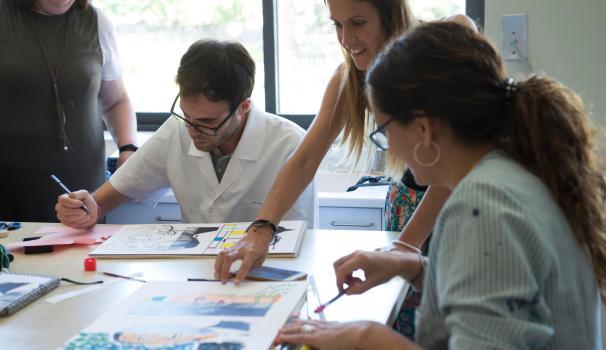
Day care centers, residences, long-stay centers, nursing homes, rehabilitation centers and private centers, among others.
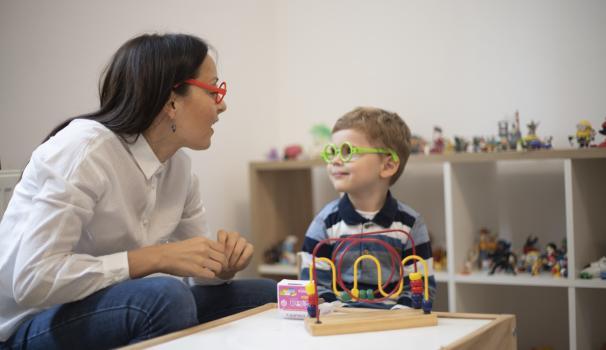
Early childhood development and care centers (CDIAP), educational services (CREDA, EAP, CSMIJ), schools and special education schools, among others.

Our work doesn't finish the moment you graduate. The Alumni department will support you to enable us to achieve an employment rate of 90% of students in the first year after graduation
The Psychology Laboratory is a space for research into new therapeutic resources. Among other things, it has virtual reality devices applied to psychology that allow for better research.
The Speech Therapy Laboratory is the ideal place to learn the diagnosis of speech and voice disorders or to learn about techniques for dealing with oral and written language problems.
Putting theory into practice is key to gaining knowledge. In the case of nursing, it is a key aspect before dealing with patients. The faculty has simulation classrooms to prepare students for clinical interventions.
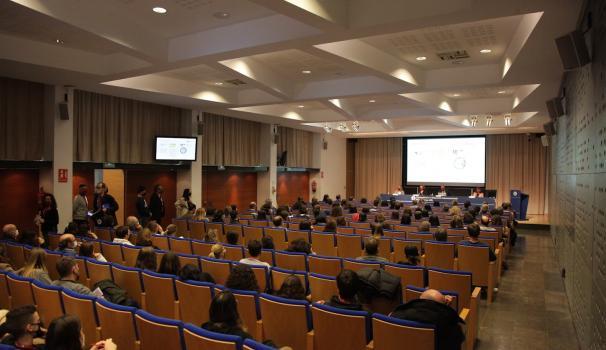
The school has an auditorium that can be used for celebrations, academic events, conferences or activities. In addition to the school's events, the space hosts other occasions that require ample space.
Music learning is an essential part of education. The School has 3 spaces dedicated exclusively to working in this field: two recording rooms and a dynamic classroom for working on movement and bodily expression.
If you are part of a research group, a professor or a PhD student and you need help with a project, you can ask for advice. This assistance includes analysis, guidance, help with applying for awards, and the financial management of projects.

Ethics in the field of research is fundamental. The Faculty Research Institutes are supported by the opinions of the Research Ethics Committees (CER-URL) to evaluate and rate projects that have ethical implications.
Do you want to improve your level of Catalan? Have you just arrived in Catalonia and don't know what to do? Are you studying English and want to reinforce your language skills? Learn at your own pace with the Language Service.
Here you will find the resources and professionals to help you achieve your goals.
If you need a quiet space to study or to do individual and group work, come to the library! Each school has its own library with computers, workrooms, reading points and an extensive catalog of documents you can consult in both hard copy and digital format.
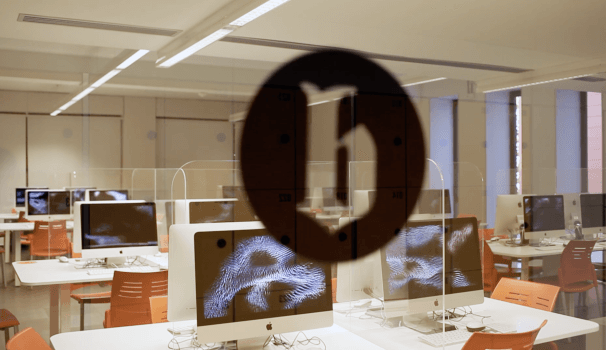
If you have a job or just need a computer, you can go to the computer classrooms or workspaces and use the Macs we have at your disposal.
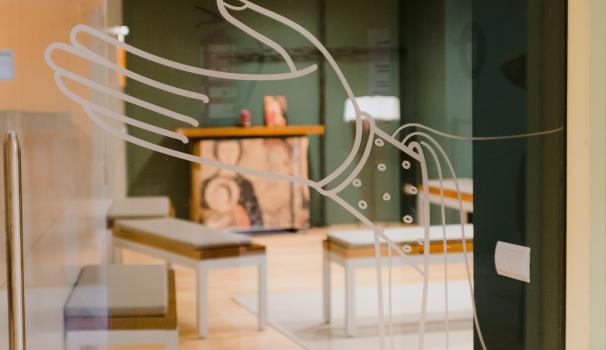
The chapel is the right place to find recollection, peace, to focus, to pray and to celebrate the Eucharist weekly and at important liturgical moments (Christmas, Ash Wednesday and Easter). The sacrament of reconciliation is also celebrated.

The 2030 Agenda Office of the Blanquerna-URL School of Psychology, Education and Sport Sciences is a project designed to ensure the achievement of the Sustainable Development Goals (SDG) and the milestones set in the Agenda, based on the joint strategies of URL institutions.

The SOPTIC (Pedagogical Guidance Service on Information and Communication Technologies) offers support in the use of ICT to both teachers and other faculty services.

Do you need guidance or support on your research project? The Methodological Advisory Service (SAM) offers you a series of procedures to guide you in your work process in the field of research.

The nerve center of the quintessential faculties is the bar. There, teachers, students and staff meet throughout the day for breaks or meals.
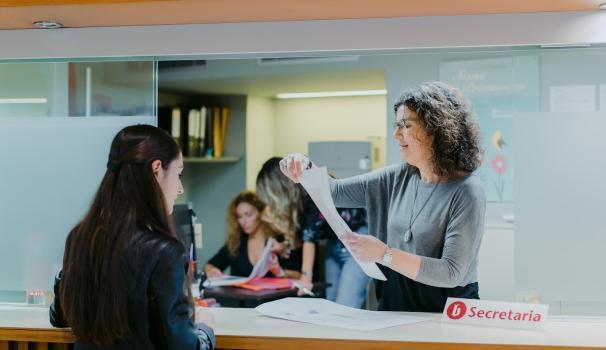
The Academic Secretaries of the Blanquerna faculties are the space for students to relate to the processes linked to the registration of official and own courses.

Would you like to receive information on pre-registration and admissions processes, scholarships and grants or validations? The SIOE is the service you need. Ask for all the information about any of these processes and discover all the possibilities at your fingertips.
Professional experience is a core part of our methodology. For this reason, we have a broad spectrum of internship agreements to meet the needs and preferences of all students. You will graduate having worked in your industry.

At Blanquerna, we put the future within everyone's reach thanks to our scholarships and grant service to start or continue studying at our schools. Financial aid is both internal and external to the university. You will find a wide range of possibilities.

Going abroad is a unique opportunity to discover the plurality of the world. Aware of the importance of the internationalization of studies, we have established mobility agreements around the world.
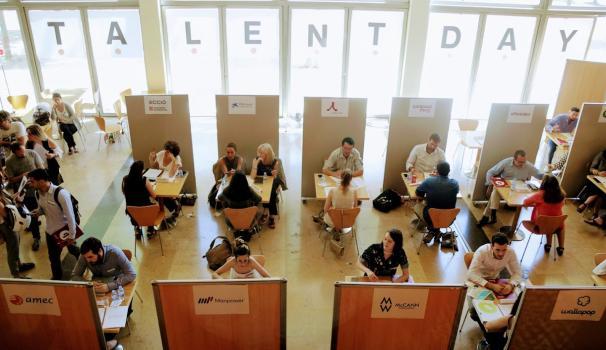
This service provides graduates with the necessary means so that they can actively participate in their professionalism and propose optimal candidates to organizations and companies looking for staff.

The leap into the world of work is always a challenge. For this reason, we provide a Job Bank for students and graduates. This service puts students in touch with companies and institutions looking for staff.
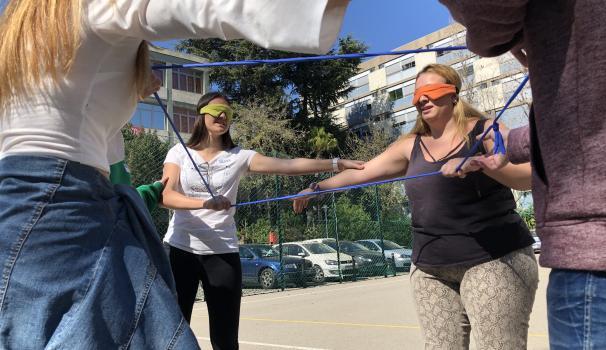
Solidarity and the struggle for human dignity are values that identify us. Solidarity Action is a volunteer program that our students can join to participate in projects in the Third and Fourth World.

Studying in Blanquerna allows you to be part of our community. Being a college student opens the door to a lot of options for continuing your vocational training beyond your time in the classroom.

Want to represent the URL in college sports tournaments? You can find a wide range of possibilities for both individual and team sports. To be a student of Blanquerna, you will have a discount at the Can Caralleu and La Salle Sport & Fitness sports complexes.

If you are in a difficult situation in the academic, personal or social field, you can request, free of charge, the personalized attention of the SOP. This is an interdisciplinary team of professionals who will guide you in dealing with the situation.
In the three Blanquerna faculties, you will find spaces for reflection isolated from the hustle and bustle dedicated to the celebration of the Faith or cultural and religious animation. If you wish, you can also receive personalized attention and information about church life.
At Blanquerna we promote personal development at all levels to people with a diversity of specific needs from a normalizing context that encourages personal autonomy and uniqueness.
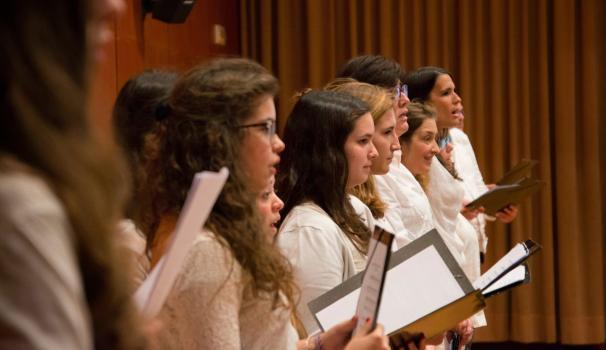
If you like music and want to take part in the concerts of institutional events and festivities, sign up for the Blanquerna Choir. There you will meet new friends and enjoy music.

Each class group must elect a representative to put forward concerns or make proposals to the faculty members and academic management. At the same time, each degree must appoint a delegate and each school a representative on the general URL council.
Contact between students and the university is constant and is channeled through the Student Council, the body that collects proposals and requests from students and facilitates university life.

Are you studying a foreign language and want to improve your level? Do it at your own pace in the language self-learning classroom. This service offers various teaching resources and materials to practice the language.
Cristina Günther Bel
Sara Paula Signo Miguel
Cristina Andres Carrillo
Eulàlia Arias Pujol
Victoria Armet García-Munté
Olga Viridiana Arreola Garcia
Lourdes Artigas Miralles
Adriana Aulet Ruiz
Marina Bernardo Flórez
Alain G.F. Blomart
Marta Bosch Ayguade
Lluís Botella Garcia del Cid
Olga Bruna Rabassa
Meritxell Campreciós Orriols
Montserrat Canals Ventura
Maribel Cano Ortiz
Josep Francesc Casamitjana Claramunt
Mercè Casanovas Pagès
Josep Castillo Garayoa
Ignacio Cifre León
Ramon Company Romero
Rocío Daniela Concha Ortiz
Natalia Contreras Gonzalez
Sílvia Contreras Regatero
Susana Del Cerro Ramon
Pilar Dotras Ruscalleda
Mònica Egea Palma
M. Victoria Fernández Puig
Josep Gallifa Roca
Raquel Garcia Ezquerra
Sandra Ger Cabero
Mercè Gimeno Santos
Antonia María Gómez Hinojosa
Clara Gomis Bofill
Laura González Sanvisens
Olga Herrero Esquerdo
Ledicia Iglesias Pazo
Ignasi Ivern Pascual
Marta Jordana Puig
Eva Liesa Hernández
Marc Llinàs Folch
Elena Lloberas Lopez de Sepulveda
Laura López Blanco
Sandra López Ferré
Judith Lorente de Sanz
Sónia Martínez Solà
Clara Mateu Martínez
Maria Paula Mayoral Serrat
Francisco Javier Medina Luque
Jaume Miró Cabrero
Natalia Molina Saiz
Josep Monsech Sala
Sara Navarro Gomez
Manel Noguera Ballus
Meritxell Pacheco Pérez
Miquel Palau Costafreda
Carolina Palma Sevillano
Miquel Àngel Pellicena Sánchez
Julieta Piastro Behar
Teresa Pretel Luque
Tània Puignou Santallusia
Miguel Angel Pulido Rodriguez
Carlota Ramírez Sendrós
Lídia Rigual Soler
Claudia Roca Hoogsteder
Mariona Roca Santos
Jordi Rusiñol Estragues
Mireia Sala Torrent
Eduardo Serrano Troncoso
Maria Dolores Soler Fernandez
Guillem Turro Ortega
Josep Maria Vila Rovira
The application process for a place in the 2026-2027 academic year begins on October 29, 2025, and consists of three phases:
The application for a place can be made online or in person and entitles the applicant to participate in the admission process.
It can be done via the Application for admission button on the page for each degree, or directly from here, and requires:
It can be done at the School itself, by going to the Student Information and Guidance Service (SIOE), and the following must be submitted:
IMPORTANT - BACHELOR'S DEGREE IN PSYCHOLOGY AND BACHELOR'S DEGREE IN NURSING: Students from High School (Batxillerat):
If, at the time of submitting the application for a place in the degrees in Psychology or Nursing, as well as for simultaneous studies in either of these two degrees (e. g., Psychology and Speech and Language Therapy, or Nursing and Nutrition), the final High School and PAU (University Entrance Exams) grades are already available and are equal to or higher than 7, the applicant will be called to enroll once admitted.
If the final entrance grades for High School and PAU (University Entrance Exams) are not available, an official certificate from the educational center must be attached, containing the average grade for the first year or the final High School grade. Once this certificate is submitted, there are two options:
Option 1. If the grade is equal to or higher than 7, the student will be called to make a conditional enrollment and may choose a shift while places are available.
Option 2. If the grade is lower than 7, the student may participate in the June place allocation, which will be based on the submitted grade as the first criterion and the date of payment of the place application as the second criterion. From the date on which the final grade of the university entrance exams becomes available, if there are still places available, only students who have submitted the certificate with their final admission grade will take part in the allocation process.
Note: In the case of students from international high schools, an official document from the school of origin must be submitted with the final average grade for the course and its equivalence to the Spanish system.
IMPORTANT - BACHELOR'S DEGREE IN PSYCHOLOGY AND BACHELOR'S DEGREE IN NURSING: Students from Higher-Level Vocational Training (CFGS):
If, at the time of submitting the application for a place in the degrees in Psychology or Nursing, as well as for simultaneous studies in either of these two degrees (e. g., Psychology and Speech and Language Therapy, or Nursing and Nutrition), the final CFGS grade is already available and is equal to or higher than 8, the applicant will be called to enroll once admitted.
If the entrance grade (neither provisional nor final) for CFGS is not available, applications for a place in the aforementioned studies can be formalized, and the student will participate in the June place allocation, which will be based on the final grade submitted via an official certificate from the educational center containing the final average grade of the qualification. The grade mentioned will be considered as the first criterion, and the date of payment of the place application as the second criterion. For the Bachelor's Degree in Psychology, 10% of places will be reserved for students from this pathway. For the Bachelor's Degree in Nursing, 30% of places will be reserved for students from this pathway.
IMPORTANT – DEGREE IN PSYCHOLOGY AND DEGREE IN NURSING: Students coming from previously started university studies:
If, at the time of applying for a place in the Psychology or Nursing degree programs, as well as for any double degree involving either of these programs (e.g., Psychology and Speech Therapy or Nursing and Nutrition), the applicant has already begun university studies, they must contact the Faculty’s Student Information and Guidance Service.
Approximately within two working days after the place application, the student will be informed by email about their admission. If admitted, the same message will invite them to formalize enrollment, including instructions on when and how to complete the procedure.
The criterion used to call admitted students to formalize enrollment will be the order of payment of the place application. For degrees with more than one shift, note that a shift may fill up during the enrollment period. The place will be definitive once the student has submitted the documentation with the final university entrance information and the first enrollment payment has been made.
For degrees taught in English, students must demonstrate a minimum B2 level of English to be admitted. The level can be accredited through the level test that all degree students must take before starting their program. To prove the minimum level, an official language certificate of B2 or higher can also be submitted: IELTS (6-7), TOEFL (IBT 90-110), CAMBRIDGE, or Official Language Schools, obtained within the last two years. Certificates from other organizations will not be accepted. The certificate does not exempt students from taking the level test to determine the English level for the first year.
It is the student's responsibility to have a level equivalent to B2 in the language of instruction of the degree to properly follow classes
The student called to enroll may choose between two options, depending on whether they already have the definitive entrance pathway or not.
Enrollment in the degree can be formalized before passing the PAU (University Entrance Exams) or CFGS or having the entrance pathway. Enrollment will be conditional on the presentation of the corresponding admission pathway. This option secures the place and allows choosing the shift, in the case of degrees with more than one shift, while places are available.
If the student does not obtain the entrance pathway, the enrollment fee will be refunded, but they will lose the place, preference in shift selection, and the amount paid for the place application (€50). If places remain available in July, they may choose to stay on the waiting list until September, and the money will be held, but they will no longer have preference for shift selection. If they do not obtain the entrance pathway by September, the enrollment fee paid will be refunded.
It will be formalized if, at the time of processing the enrollment, the student already has the university entrance pathway. They may opt for the available places and shifts.
IMPORTANT: Degrees with more than one shift may exhaust places in a specific schedule with conditional enrollment. The required documentation must be uploaded via the Document Repository.
The place will be definitive once the student has submitted the documentation with the final university entrance information and the first enrollment payment has been made.
NOTE: Students in the Communication Degrees must take an English level test that will not be exclusionary for admission but will determine the level at which they start the first year. Each student will be informed of the test date and time by email.
Studies can be paid upfront and/or in interest-free installments. If payment by installment is selected, upon enrollment the student will have two business days to pay 50% of the total cost of the enrolled credits, using their chosen form of payment; this payment will not be taken by direct debit. The remaining 50% will be divided into nine monthly payments from October to June via bank direct debit from the account provided at the time of enrollment. Prices for each academic year are updated annually.
Once payment is made, the corresponding receipt of enrollment can be viewed in the student's Document Repository and via the student's portal.
For the foreign student admission process, the following considerations and requirements must be taken into account in accordance with the prevailing regulations.
Students must apply to the Universidad Nacional de Educación a Distancia (UNED) to obtain the credential certifying that they meet the requirements to access university studies within the state education system (UNED Credential). Therefore, they do not need to take the PAU (University Entrance Exams), but without the mentioned credential, they cannot enroll in our degrees.
The education systems that can be accessed through this pathway are: Germany, Andorra, Austria, European Schools (European baccalaureate), International Baccalaureate, Belgium, Bulgaria, Croatia, Denmark, Slovakia, Slovenia, Estonia, Finland, France, Greece, Hungary, Ireland, Iceland, Italy, Latvia, Liechtenstein, Lithuania, Luxembourg, Malta, Norway, the Netherlands, Poland, Portugal, the United Kingdom, the Czech Republic, Romania, Sweden, Switzerland, China and Cyprus.
These students may access our degrees by submitting the homologation of the High School diploma from the Spanish Ministry of Education or from the autonomous communities with transferred competence, such as the Generalitat de Catalunya. Proof of application for convalidation will be sufficient for students to enroll and begin taking a bachelor's degree course, however full enrollment is conditional on convalidation being confirmed. Bear in mind that convalidating studies can take more than three months to complete, so this process should be done in parallel with the admissions process to our bachelor's degrees. If the convalidation resolution is not obtained in the terms requested by the interested party, the results of any exams taken, or the enrollment made as a result thereof, are rendered null and void.
For any questions or inquiries about the place application or enrollment process, contact [email protected]
The objective of the bachelor's thesis is to evaluate the assimilation of the core skills acquired during the bachelor's degree. Essentially, it consists of writing a research project or designing an intervention program that allows the student to prove they have assimilated the degree's competences. The curriculum of the double degree includes two final theses, corresponding to the degree in Psychology and the degree in Speech and Language Therapy, thus ensuring that students receive the maximum training in the competencies of the two degrees.
To write the thesis, the student can decide to do a research project or design an intervention program, and the subjects may be related to any of the areas of the profession or make reference to it.
The work will be conducted individually. Projects must be written in Catalan, Spanish, or English. In any case, the work will have to include a summary in English, Catalan, and Spanish.
The bachelor's degree thesis will last two semesters and will be supervised by a professor-advisor, both individually and through Seminar sessions. Thus, there will be a space of two hours per week in which the teacher-advisor will hold group seminar sessions in order to share the process being conducted (set guidelines and organize the activity, choose the topic, provide documentation, plan the activities, etc.). These Seminar sessions will be alternated with individualized follow-up/tutoring (in which each advisor will personally follow up on the thesis).
There will be three grading systems and assessment times:

Find the help that best suits your needs between Blanquerna scholarships and grants, public and private grants or funding grants.
Blanquerna-URL is waiting for you!
At Blanquerna-URL, we emphasize the importance of internships at external centers. That is why we have agreements with more than a thousand organizations and entities where you can apply your theoretical knowledge to the professional world and start focusing on your professional future based on the reality of the sector.
Hospital de la Santa Creu i Sant Pau · Hospital Maternoinfantil Sant Joan de Déu · Hospital Universitari Vall d’Hebron · Hospital Universitari Sagrat Cor · Consorci Sanitari de Mataró · Parc Sanitari Pere Virgili · Vidal i Barraquer Foundation · Orienta Foundation · Fundació Puigvert · Institut Guttmann, Private Foundation · Eulàlia Torres de Beà Private Foundation· Nou Barris Foundation for Mental Health · CAP Drassanes (Barcelona) · CAP II Maresme (Mataró) · Sanitas Sarrià Day Center · Dreta de l’Eixample Day Center (CPB) · Baix Llobregat Day Hospital · Desconnecta Day Hospital · CSMA Sant Feliu de Llobregat · CSMA Pins d’or · CSMA de Martorell · Badalona Mental Health Center 2 · CMIJ Vilafranca del Penedès · Welfare and Development Association · Drug Addicts Support Association (AAT) · Care and Research of Social Addictions · CAT Barcelona · Center for Reintegration Initiatives · CASD de Vilafranca del Penedès · CAS Garbivent · Red Cross · Vallparadís Foundation · Frederica Montseny Social and health care center · Isabel Roig Sociosanitary Center · Health and Community Foundation · ISPA Behavioral Neurology and Psychogeriatrics Day Center · MAP Geriatrics Advice and Services · Prytanis · Asil de Sant Andreu de Palomar Residence · Vallès Friends of Neurology Association · Catalan Association of Traumatic Brain Injury and Brain Damage (TRACE) · Uszheimer Private Foundation for neurodegenerative diseases · INA Memory · Uparkinson Integral Therapy · CDIAP Taulí Park Hospital Consortium · CDIAP Del Garraf · CDIAP ASPACE · CDIAP L'Espiga · CAD Terrassa · Jaume Cuspinera Occupational Training Center · CROMOSUMA Foundation · Aura Project Foundation · Rubricatus Foundation · Prevent Foundation · ASPROSEAT Group · Miroia Center for Humanistic Psychology · Trivium Psychopedagogical and Speech Therapy Center · Consultation and Voice · IPSIDE, Psychology and development · Psychopedagogical and Speech Therapy Reeducation Center · Vall d'Hebron Oncological Research Institute - VHIO · BarcelonaBeta Brain Research Center Foundation · Clúster Barcelona, Promoció i Canvis per la Salut · Entredogs Therapy · Mona Foundation · Humanimalia Association · Llobregat Delta Equine Therapy Association · El racó de Milú · Penitentiary centers · Technical Advice and Victim Care Team · Barcelona Criminal Technical Advice Team · Technical Advisory Team in the field of family · Secretariat for Criminal Measures, Reintegration and Victim Support · Mediation and Technical Advice Service · ITA · Center for Prevention and Treatment of Anorexia and Bulimia (ABB) · Khepra · SETCA
As the European Union points out, gender equality is not only a matter of social justice but also affects the results of teaching and research. Promoting gender equality in research and innovation is one of the European Commission's commitments, and it supports the explicit integration of a gender perspective in Horizon 2020 projects. However, this recommendation is often poorly understood and misapplied. Various documents are presented here with a view to contributing to a better understanding and application of the gender perspective in teaching and research.
RELATED PROGRAMS
We equip you for change


